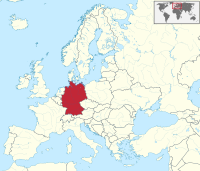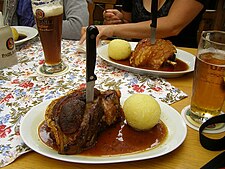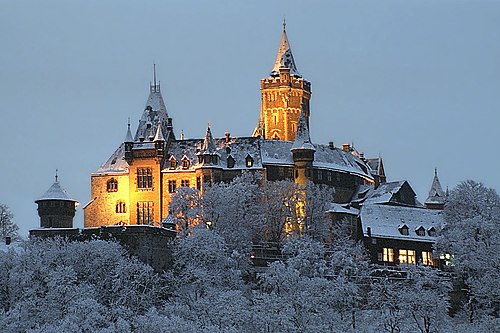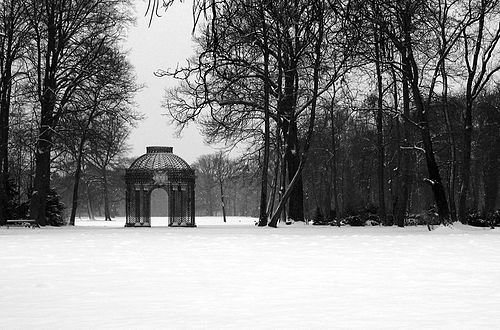Welcome to the Germany Portal!
Willkommen im Deutschland-Portal!

|

|

| |
Germany (German: Deutschland), officially the Federal Republic of Germany, is a country in Central and Western Europe, lying between the Baltic and North Seas to the north and the Alps to the south. It borders Denmark to the north, Poland and the Czech Republic to the east, Austria and Switzerland to the south, France to the southwest, and Luxembourg, Belgium and the Netherlands to the west.
Germany includes 16 constituent states, covers an area of 357,578 square kilometres (138,062 sq mi) and has a largely temperate seasonal climate. With 83 million inhabitants, it is the second most populous state of Europe after Russia, the most populous state lying entirely in Europe, as well as the most populous member state of the European Union. Germany is a very decentralized country. Its capital and largest metropolis is Berlin, while Frankfurt serves as its financial capital and has the country's busiest airport.
In 1871, Germany became a nation-state when most of the German states unified into the Prussian-dominated German Empire. After World War I and the Revolution of 1918–19, the empire was replaced by the parliamentary Weimar Republic. The Nazi seizure of power in 1933 led to World War II, and the Holocaust. After the end of World War II in Europe and a period of Allied occupation, two new German states were founded: West Germany, formed from the American, British, and French occupation zones, and East Germany, formed from the western part of the Soviet occupation zone, reduced by the newly established Oder-Neisse line. Following the Revolutions of 1989 that ended communist rule in Central and Eastern Europe, the country was reunified on 3 October 1990.
Today, Germany is a federal parliamentary republic led by a chancellor. It is a great power with a strong economy. The Federal Republic of Germany was a founding member of the European Economic Community in 1957 and the European Union in 1993. Read more...
Selected article

Max Weber (April 21, 1864 – June 14, 1920) was a German political economist and sociologist who is considered one of the founders of the modern study of sociology and public administration. He began his career at the University of Berlin, and later worked at Freiburg University, University of Heidelberg, University of Vienna and University of Munich. He was influential in contemporary German politics, being one of Germany's negotiators at the Treaty of Versailles and the member of the commission charged with drafting the Weimar Constitution.
His major works deal with rationalisation in sociology of religion and government, but he also contributed much in the field of economics. His most famous work is his essay The Protestant Ethic and the Spirit of Capitalism, which began his work in the sociology of religion. More...
Selected picture
Related portals
- Parent portals
- Regional
- History
 Holy Roman Empire (900–1806)
Holy Roman Empire (900–1806) East Germany (1949–1990)
East Germany (1949–1990)
- Neighbouring countries
Anniversaries for June 10

- 1190 – Frederick I, Holy Roman Emperor dies while crossing the Saleph River
- 1804 – Birth of ornithologist Hermann Schlegel
- 1924 – Birth of computer scientist Friedrich L. Bauer
- 1929 – Birth of actor and comedian Harald Juhnke
- 1982 – Death of film director Rainer Werner Fassbinder
Did you know...
- ... that Samuel Kummer chose for his first recital as the organist of the restored Frauenkirche in Dresden music by Bach, Brahms, Max Reger, Louis Vierne, and himself?
- ... that over the course of several decades, the missionaries of New Zealand's German Mission House failed to convert a single person?
- ... that German factory worker Julius Welschof now plays in the National Football League?
- ... that Peter Demetz, who taught German literature at Yale University from 1956 to 1991, was born in Prague where he was persecuted under the Nazis and escaped the Communist regime in 1949?
- ... that the Lutheran St. Trinitatis in Wolfenbüttel, consecrated in 1719, is a Baroque church with a facade recalling that of a palace?
- ... that Romani Holocaust survivor Philomena Franz wrote about her deportation to Auschwitz, internment in Ravensbrück, escape from a camp near Wittenberge, and concealment by a farmer?
- ... that baritone Liviu Holender chose lieder by five composers whose music was banned by the Nazis—Schreker, Zemlinsky, Mahler, Korngold and Schönberg—for a recital at the Oper Frankfurt?
- ... that ancient humans cared for a 14,000-year-old puppy?
Selected cuisines, dishes and foods

Schweinshaxe (German pronunciation: [ˈʃvaɪns.haksə] ), in German cuisine, is a roasted ham hock (or pork knuckle). The ham hock is the end of the pig's leg, just above the ankle and below the meaty ham portion. It is especially popular in Bavaria as Schweinshaxn [ˈʃvaɪns.haksn̩] or Sauhax(n) [ˈsaohaks(n̩)]. A variation of this dish is known in parts of Germany as Eisbein, in which the ham hock is pickled and usually slightly boiled.
Schweinshaxe is one of the formerly typical peasant foods, in which recipes were composed to make inexpensive and tough cuts of meat more palatable (see, for beef, the popular Sauerbraten). Such inexpensive cuts usually require long periods of preparation. The meat is sometimes marinated for days, and in the case of big cuts up to a week. The Schweinshaxe is then roasted at low temperatures, typically—depending on size—for two to three hours. (Full article...)Topics
Categories
Things you can do

A list of articles needing cleanup associated with this project is available. See also the tool's wiki page and the index of WikiProjects.
Here are some tasks you can do. Please remove completed tasks from the list.
- Requests: Columbiahalle, German Archaeological Institute at Rome, Deutsche Familienversicherung, Dietlof von Arnim-Boitzenburg, Rolf von Bargen, Micky Beisenherz, Hennes Bender, Georg Bernhard (1875–1944), Eduard Georg von Bethusy-Huc, Rolf Brandt (1886–1953), Jan Philipp Burgard, Georg Arbogast von und zu Franckenstein, Georg Gafron, Ferdinand Heribert von Galen, Gundula Gause, Karl-Heinz Hagen, Herbert Helmrich, Nils von der Heyde, Monty Jacobs (1875–1945), Hans Katzer, Siegfried Kauder, Matze Knop, Wolfgang Kryszohn, Claus Larass, Isidor Levy (1852–1929), Markus Löning, Anke Plättner, Hans Heinrich X. Fürst von Pless, Gerd Poppe, Victor-Emanuel Preusker, Günter Prinz, Hans Sauer (inventor), Franz August Schenk von Stauffenberg, Paul Schlesinger (1878-1928),Oscar Schneider, Hajo Schumacher, Otto Theodor von Seydewitz, Dorothea Siems, Werner Sonne, Anton Stark, Udo zu Stolberg-Wernigerode, Christoph Strässer, Torsten Sträter, Joseph von Utzschneider, Jürgen Wieshoff, Hans Wilhelmi, Alexandra Würzbach
- Unreferenced: Unreferenced BLPs, Bundesautobahn 93, Benjamin Trinks, Steeler (German band), Amelie Beese, Zoologisches Museum in Kiel, Emil Krebs, Prussian semaphore system, Partenstein, Peter Krieg, Porsche 597, Christa Bauch, Curt Cress, Stefan Beuse
- Cleanup: 53541 issues in total as of 2024-03-03
- Translate: Articles needing translation from German Wikipedia
- Stubs: Albersdorf, Thuringia, Ingo Friedrich, Berndt Seite, Federal Social Court; 107 articles in Category:German MEP stubs
- Update: Deutsches Wörterbuch
- Portal maintenance: Update News, Did you know, announcements and the todo list
- Orphans:
Orphaned articles in Germany

- Photo: Take/Add requested photographs
- Expression error: Unrecognized punctuation character ",".
Associated Wikimedia
The following Wikimedia Foundation sister projects provide more on this subject:
-
 Commons
Commons
Free media repository -
 Wikibooks
Wikibooks
Free textbooks and manuals -
 Wikidata
Wikidata
Free knowledge base -
 Wikinews
Wikinews
Free-content news -
 Wikiquote
Wikiquote
Collection of quotations -
 Wikisource
Wikisource
Free-content library -
 Wikiversity
Wikiversity
Free learning tools -
 Wikivoyage
Wikivoyage
Free travel guide -
 Wiktionary
Wiktionary
Dictionary and thesaurus
-

-

-

-

-
Random portal


































